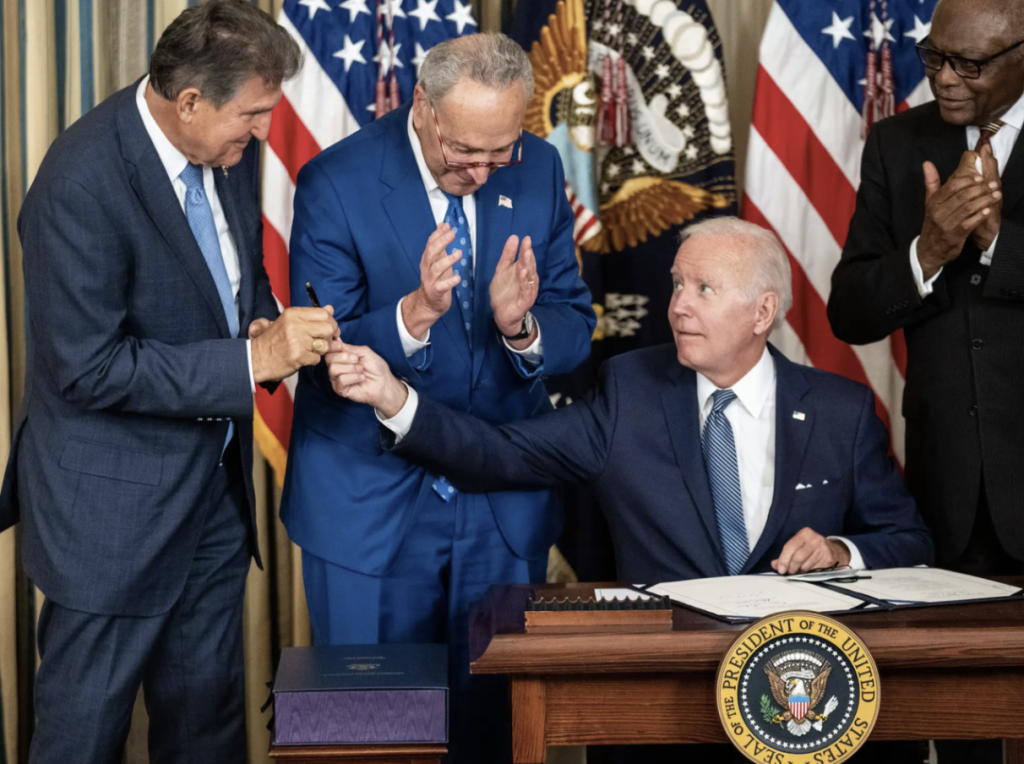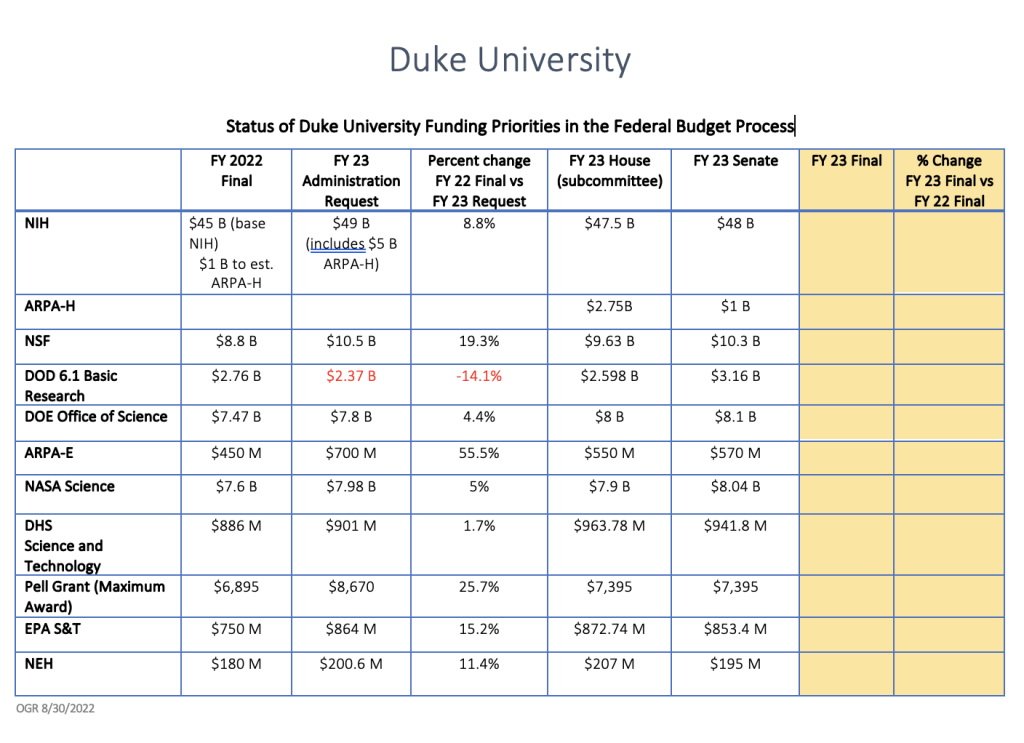The Will They or Won’t They Edition

It was anything but quiet in the nation’s capital since the end of the last academic year. While making progress on the FY23 budget, Congress also successfully passed major legislative packages on both climate and U.S. competitiveness, sending them to President Biden’s desk to be signed into law. The Biden administration also proposed new Title IX regulations, unveiled a much-anticipated student loan forgiveness program and nominated individuals to fill several key positions. Here is all you need to know about these and other federal highlights of significance to Duke University and the higher education community since Duke’s Office of Government Relations’ last update this spring.
Budget & Appropriations
As Congress makes its return from August recess, the FY23 budget and its impending September 30th deadline will be the focus for appropriators. In the final days before each chamber broke for recess, the House successfully passed half of its FY23 appropriation bills and Senate Democrats released their own twelve appropriations bills. With less than a month before government funding runs out, lawmakers will likely look to vote on a temporary stopgap bill to extend funding beyond its current deadline. However, political dynamics resulting from this summer’s maneuvering on various bills foreshadows a rocky path for a continuing resolution. Duke’s Office of Government Relations has prepared this flow chart to provide more information about the federal appropriations process. Below is a table illustrating the current status of some of Duke’s appropriations priorities.

President Biden also signed the Inflation Reduction Act into law on August 16th. The long-awaited climate, health care and tax legislation, previously shelved as the Build Back Better plan, will invest roughly $300 billion in climate and energy initiatives. Of interest to the higher education community, this includes $2 billion for the Department of Energy (DOE) National Labs to accelerate breakthrough energy research and several environmental and climate justice block grants and resiliency programs through which universities can be considered a partner.
Research, Innovation & Competition
This summer was marked by considerable drama and a final resolution to the ongoing conference negotiations to align the U.S. Innovation and Competition Act (USICA) and the America COMPETES Act. The prospects for passage of a competitiveness measure grew dim as negotiations stalled, first due to general disagreements over the direction of the final package, then after Republicans walked away after Senate Democrats announced movement on its Build Back Better budget reconciliation measure. In response to the legislative hold-up, Senate Democrats opted to draft the “CHIPS and Science Act,” which combined the $52 billion emergency funding the semiconductor industry under the CHIPS for America Act with negotiated section of USICA and COMPETES focused on key science authorizations. This ultimately bipartisan legislation officially authorizes the new Technology, Innovation and Partnerships Directorate at the National Science Foundation (NSF), reauthorizes the other core NSF directorates, along with the Department of Energy Office of Science, NASA, establishes a new federal initiative focused on bioengineering and much more.
In other innovation policy updates, Congress moved forward on the framework for the new Advanced Research Projects Agency – Health. Earlier this summer, the House of Representatives approved its vision for the agency and now awaits Senate action. On the administration side, it was announced that the new ARPA-H will be housed within the National Institutes of Health (NIH) and Adam Russell D.Phil.(T ‘95) was named acting deputy director. The agency will support transformative high-risk, high-reward research to drive biomedical and health breakthroughs.
Wrapping up the summer with some rather blockbuster news, the White House Office of Science and Technology Policy (OSTP) released updated policy guidance to increase the accessibility of federally supported research, which includes dropping an optional 12-month embargo on publications and supporting data from federally funded research. The guidance memo requests federal agencies to update and/or develop public access policies to ensure immediate, equitable and transparent access to federally-funded research no later than December 31, 2025.
Foreign Influence and Research Security
As noted in previous updates, the competitiveness proposals moving through Congress were a focus for provisions related to research security. The final CHIPS + Science bill does contain several security-focused provisions related to foreign talent recruitment programs and a new provision requiring an annual summary report to NSF from universities outlining financial support of $50,000 or more from foreign sources associated with countries of concern. However, several of the more concerning provisions found in USICA, like the proposed expansion of a Committee on Foreign Investment in the US (CFIUS) review of certain gifts and contracts between foreign individuals and universities and new faculty disclosure of foreign gifts and contracts, were dropped from the package.
On the topic of disclosure, work has continued on the implementation of National Security Presidential Memorandum (NSPM)-33, which directs the federal science agencies to develop standardized guidelines for the disclosure of information to assess conflicts of interest and commitment among researchers applying for federal funding. Last week, the National Science and Technology Council’s Subcommittee on Research Security released draft standardized disclosure forms for biographical sketch and current and pending support with a public review and comment period.
As conversations around research security policy continue to develop, the National Science Foundation (NSF) has asked the National Academies of Sciences, Engineering, and Medicine (NASEM) to hold a workshop this fall on factors affecting the classification of federally funded research. Assistant Secretary for Export Enforcement at the U.S. Department of Commerce’s Bureau of Industry and Security, Matthew Axelrod, also announced a new initiative at the department to help academic research institutions protect themselves from national security threats.
Immigration
As the globe continues to rebound from COVID-19-related challenges, the Biden administration is making efforts to resolve ongoing immigration delays and backlogs. The U.S. Citizenship and Immigration Services (USCIS) recently released its annual report, which outlines some of the most significant challenges individuals and employers encounter when applying for immigration benefits with the agency.
The Department of Homeland Security (DHS) announced that it would designate Afghanistan for Temporary Protected Status (TPS) for 18 months, effective through November 20th, 2023. In addition, in July both the Departments of State and Homeland Security announced their ongoing efforts to support Afghan Special Immigrant Visa (SIV) applicants.
Student Aid & Other Issues Related to Higher Education
The Department of Education officially published its notice of proposed rulemaking (NPRM) to amend the regulations implementing Title IX in the Federal Register on July 12th, with comments on the proposed rule due on September 12th. Duke University has worked closely to help draft comments to be submitted on behalf of the Association of American Universities and the American Council on Education.
Meanwhile, the White House announced its three-part plan to address student loan relief as well as its plans to amend Title IV of the Higher Education Act (HEA) to create targeted student loan forgiveness programs. The plan includes a final extension of the pause on student loan repayment, interest, and collections and cancellation up to $20,000 for Pell Grant recipients and up to $10,000 for non-Pell Grant recipients. The administration will be releasing more specifics in the coming months.
The U.S. Supreme Court announced it will deconsolidate the Harvard and UNC-Chapel Hill affirmative action cases it plans to hear this fall. Duke University signed an amicus brief, along with a group of higher education institutions, in support of race-conscious admissions policies, emphasizing the profound importance of student body diversity.
Appointments and Confirmations of Relevance for Higher Education
Several key additions to the Biden administration have been named over the last several months, including Arati Prabhakar to be the next director of the White House Office of Science and Technology Policy (OSTP). Prabhakar’s nomination was advanced through the Senate Commerce, Science, and Transportation Committee by a vote of 15 to 13 and her nomination now awaits full committee approval. Prabhakar previously led both the National Institute of Standards and Technology (NIST) and the Defense Advanced Research Projects Agency (DARPA).
For an updated list of key administration personnel relevant to higher education, view Duke’s Office of Government Relations’ Federal Government page here.
The 2022 Midterm Elections
North Carolina’s 2022 primary elections took place this June and the upcoming statewide general election will be held on November 8, 2022. Since the 2020 election, the state gained a new congressional seat, creating North Carolina’s fourteenth district. Our office will be closely watching the races for both the state’s fourth district and Senate (which includes Duke University) as Rep. David Price (D-NC), who represents the fourth district, and Sen. Richard Burr (R-NC) are set to retire at the end of the 117th Congress.
As the election season continues, you can learn more about Duke University’s policies on voting, political activity and engagement with government officials here.
What’s Going On at Duke in DC and the Office of Government Relations
Duke in DC and Duke’s Office of Government Relations highlighted a mix of faculty expertise throughout this spring and summer. Event programming included a Beyond Talking Points series of briefings on pandemic preparedness – exploring topics related to the U.S. public health infrastructure and environmental practices – and a congressional briefing on the Blue Economy and ocean innovation.
On Capitol Hill, Duke’s Lanty L. Smith ’67 Professor of Law Joseph Blocher spoke before the Senate Judiciary Committee at a hearing titled “After the Highland Park Attack: Protecting Our Communities from Mass Shootings.” The hearing was centered on how gun violence might be curbed following recent mass shootings.
Rounding out an event-filled summer, over 200 members of the Duke community traveled to Washington, DC as part of Duke’s reimagined immersive pre-orientation program. The Duke in DC office, located in the heart of downtown D.C., served as a home and central convening space for the first-year students, as well as faculty, staff and student orientation leaders.
Posted 10/06/22
